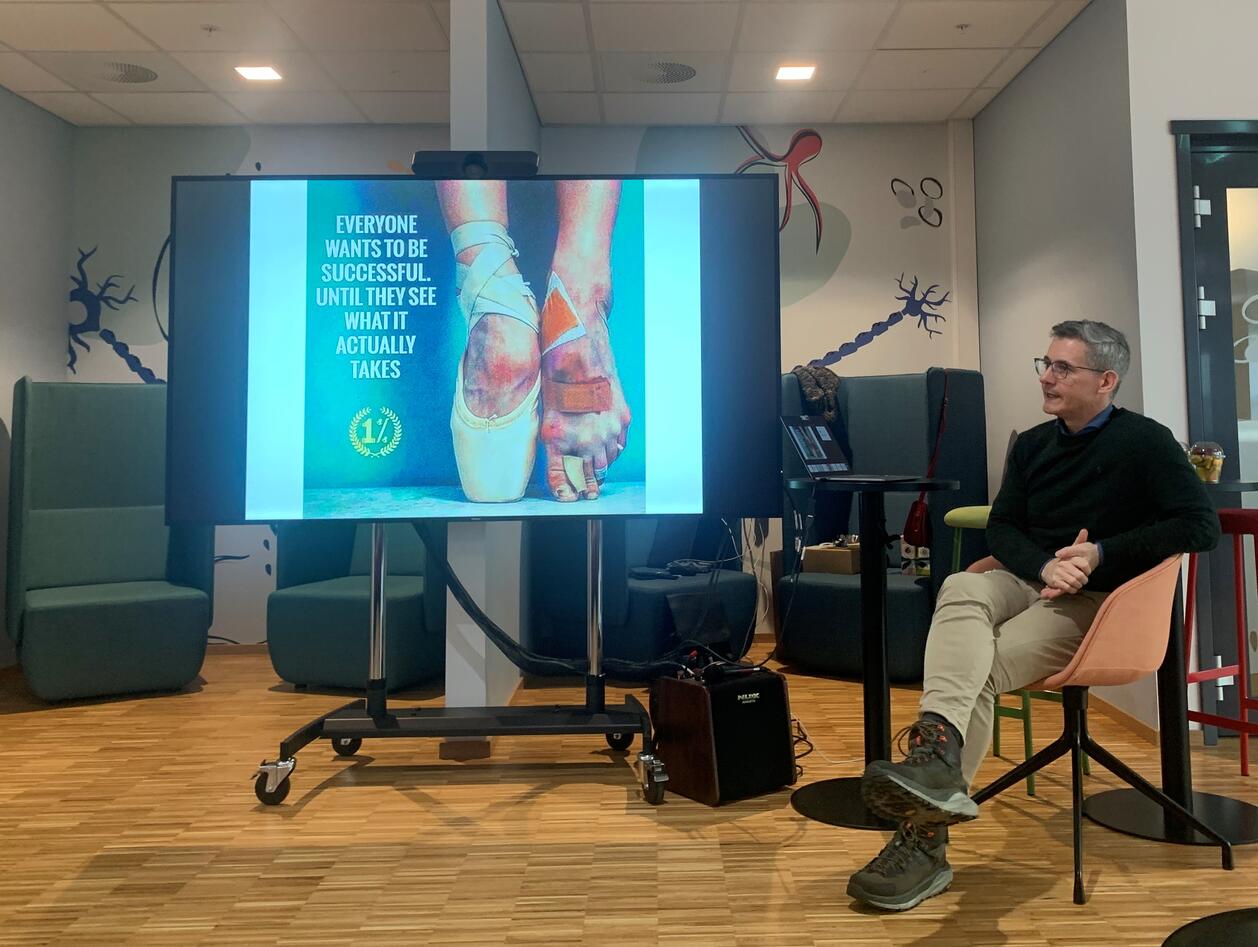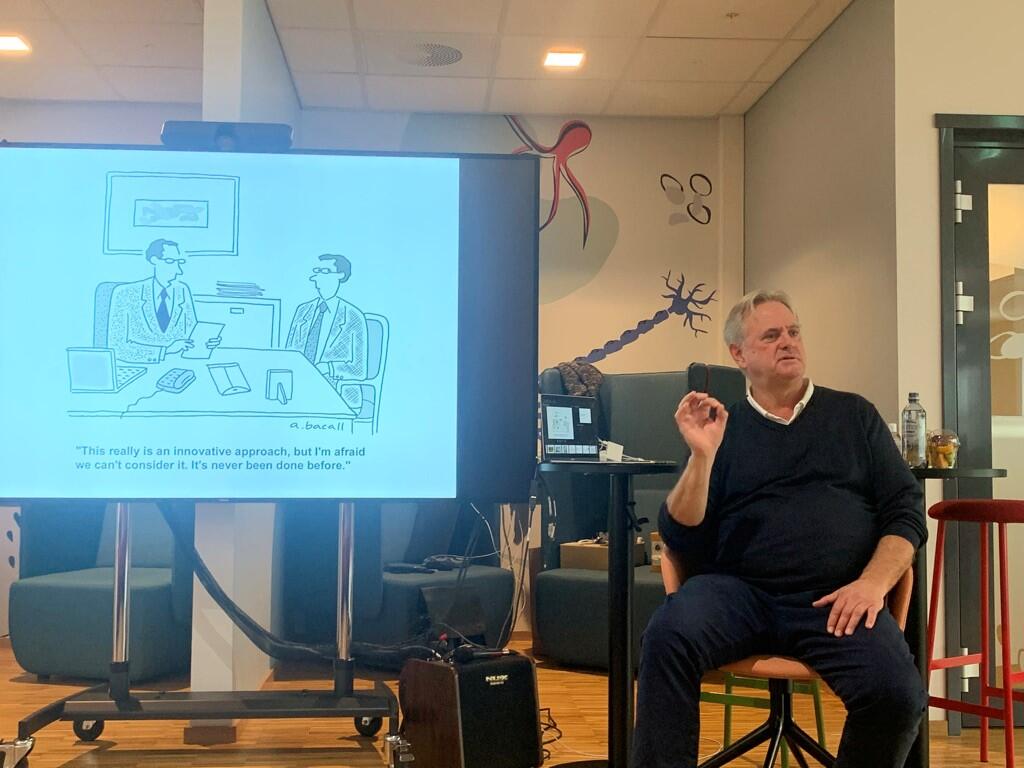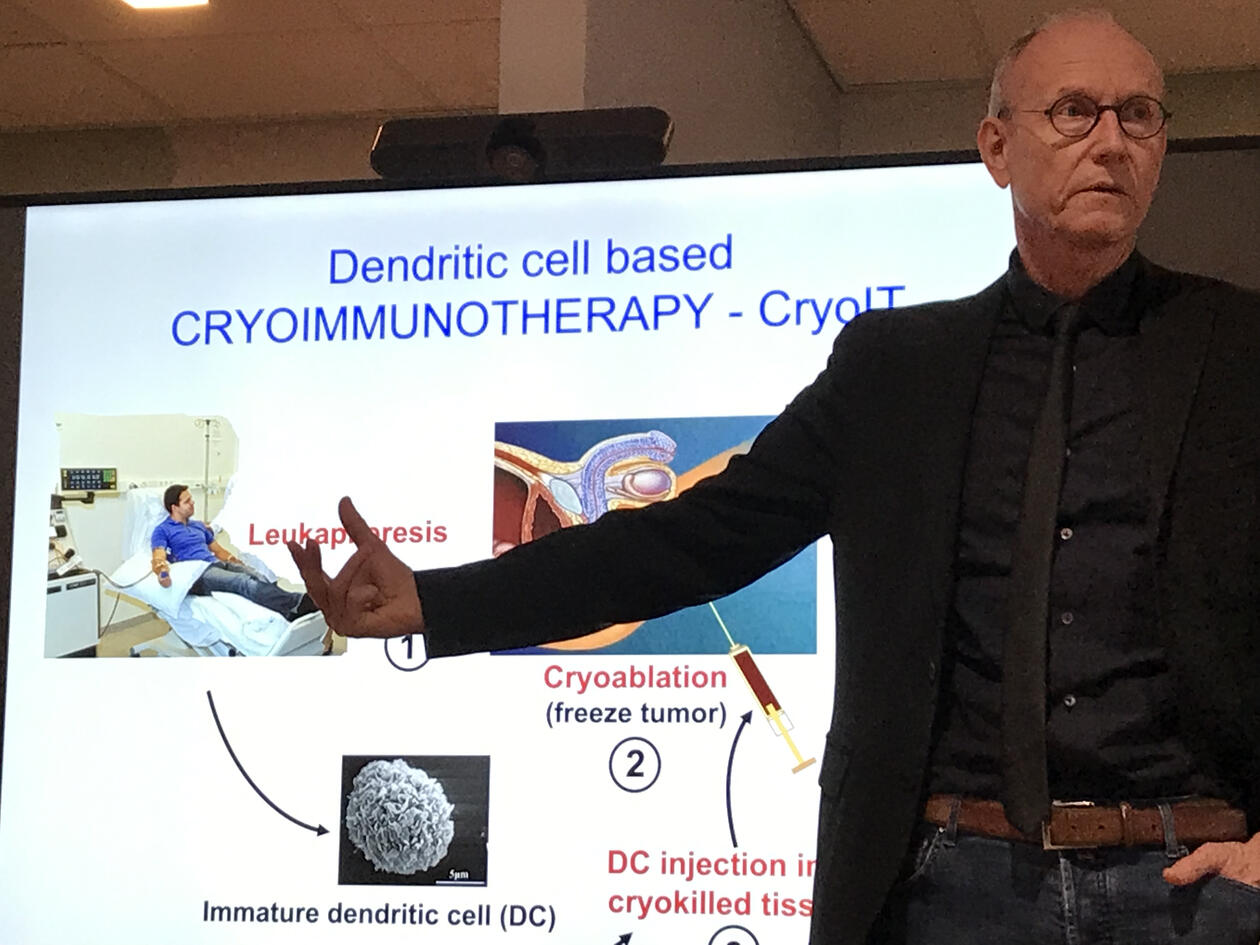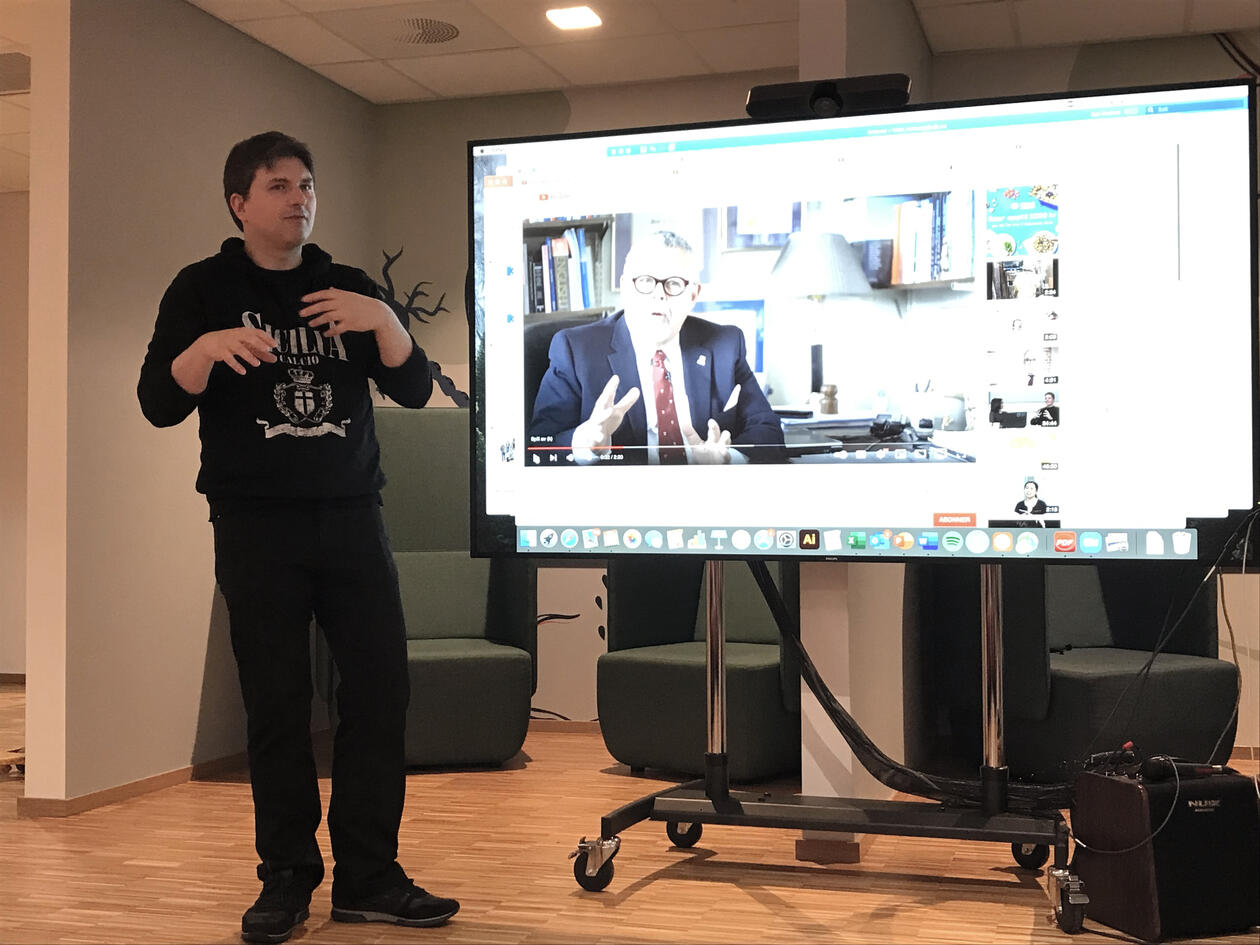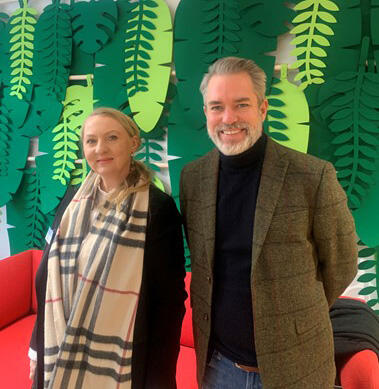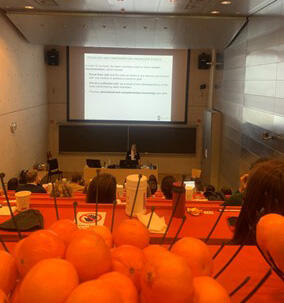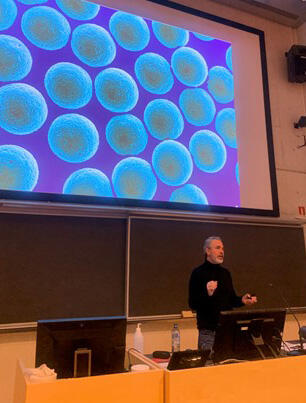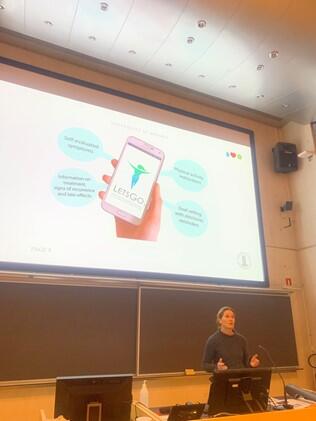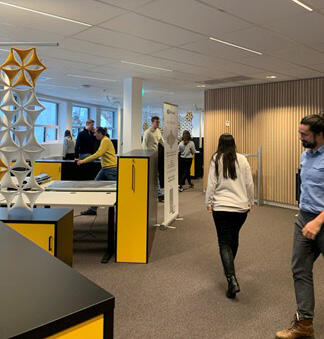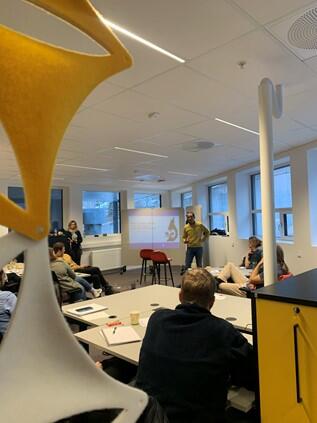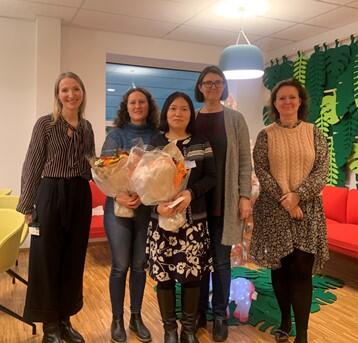Strengthening the focus on Health Innovation
The PhD level course on Health Innovation, CCBIONEUR912, was kicked off November 8-9, 2021, at the facilities of the new medical incubator EITRI. CCBIONEUR912 is joining the course SDG900 as the second innovation course offering at UiB on the PhD level. It is the first PhD course on health innovation and thus an invaluable offering for medical researchers at the beginning of their research careers, giving insights on how to bring research to society, providing perspectives on an alternative, entrepreneurial career path, and inspiring the course attendees with examples of people who have walked this path before them.

Hovedinnhold
Knowledge that shapes the society
The new PhD level course on Health Innovation is organized by the CCBIO Research School for Cancer Studies and the Neuro-SysMed Research School in Translational Neuroscience, and organizing committees from both centers have been involved to make this course a reality. This was the first of two modules, the next to be held December 2-3.
At the opening ceremony, CCBIO Centre Director Lars A. Akslen and Neuro-SysMed Director Kjell-Morten Myhr both emphasized the importance of innovation in research centers.
Senior Adviser Yves Aubert at the UiB’s Division of Research and Innovation, who has been instrumental in the planning and realization of this course, participated at the opening and addressed the question: Why innovation? Aubert discussed the University of Bergen’s (UiB) societal mission and the government’s main goal to strengthen competitiveness and innovation capability to meet major societal changes. Innovation, Yves said, may be defined as knowledge that shapes the society, and through facilitating an innovation culture in academia, the universities will create not only the knowledge but also the new processes, new technologies and products needed to enable an adaptable society. The new goal may thus contribute to decrease the disconnection between academia and the outside world. Aubert further introduced UiB’s incentives for innovation for students, including UiB Idé, Bergen Entrepreneurship Academy and Innovation HuB UiB as well as other incentives in the making.
In the midst of a mindset shift
The students were also invited to explore the opportunities available at the new medical incubator EITRI, as Maija Slaidina, Senior Advisor at the Faculty of Medicine, UiB and Assistant Director of EITRI, gave them a guided tour of EITRI’s brand new facilities. The students enjoyed the tour and were very happy with the four days spent in this informal atmosphere.
Since the goal for UiB to be a driving force for innovation and economic development is relatively new, Helge Ræder, Pro-Dean for Innovation at the Medical Faculty, was invited to talk about the innovation culture and mindset shift at the Medical Faculty and the incentives for PhD students and younger researchers to innovate. He explained that promoting innovation is one of UiB’s four main tasks, as set out by the Ministry of Research and Higher Education. He used the tangled history of mRNA vaccines, where hundreds of scientists had worked on mRNA vaccines for decades before the coronavirus pandemic brought a breakthrough, as an example of the art of seeing before others. This is a good and timely example, since before the transformation of innovation, most people are blind to the potential of the future, and the process of seeing this value, which can be optimized, is essential for the mindset shift that is required to build a stronger innovation culture.
Building innovation into research projects and project proposals
A pre-course survey revealed that the majority of students attending were particularly eager to learn about available funding opportunities. Yves Aubert gave introductory presentations to the students on the similarities and differences between research and innovation, and also on how to build innovation into their research projects and project proposals. The students were introduced to the available funding instruments for the various stages of development from Tine Torbjørnsen at the Norwegian Research Council. The students also had the unique opportunity to familiarize with the perspective of early-stage venture capital funds from Farzad Abdi-Dezfuli, PhD and partner at Sarsia Management AS. Abdi-Dezfuli also gave the students insight into the anatomy of a good investment case – and importantly – its pitch.
Senior Advisor for Innovation and Research at the Faculty of Medicine Andreas Westermoen introduced the students to the legal and practical framework for research-based innovation, including how to protect and exploit their intellectual property. This topic was of particular interest to the students in November, and the students were very pleased that Westermoen covered the topic in even greater detail in the December module. Kine Gregersen, key account manager of the Health/Medical division of the tech transfer office VIS, introduced the students to the process from idea to exploitation in the pipeline of VIS, and also highlighted the importance of user involvement, and a thorough evaluation of user needs in the process, a topic that the students will discuss further with Innovation Manager at VIS, Tone Skår, in the online part of the program. Tone Skår is head of the Norwegian Smart Care Cluster (NSCC) Vestland, and she will also present some of the exciting projects of NSCC to the students online.
Inspiration from researchers with inner drive and dedication
The course benefits greatly from close collaboration and inspirational presentations from CCBIO and Neuro-SysMed affiliates with professional expertise and experience. Altogether, the various presentations displayed a wide variety of ‘problems’ and ‘solutions’ and also various routes to exploitation of research-driven innovations.
Professor Jim Lorens at CCBIO and the Department of Biomedicine, who was recognized by former prime-minister Erna Solberg for his excellence in research driven innovation and job creation, highlighted how the rich innovation culture at Stanford University, one of the world’s leading technology and research organizations, were an essential inspiration for his own career path, and encouraged him to think outside the box. Emmet McCormack, Professor at CCBIO and K2/UiB and founder of Kinn Therapeutics, was one of the invited inspirational presenters who has been successful in founding a company based on his research. He shared his insight in what it actually takes to make a successful company in addition to running a research lab. He also made the important point that even in a highly competitive environment a unique idea or solution is not always necessary to make a company successful, sometimes it is enough just to be best at what you’re doing! Karl Henning Kalland, Professor at CCBIO and K2/UiB presented his research and the exciting work of the company he founded, Alden Cancer Therapy II.
Innovative digital interventions and health services
Jonny Klemetsen, CEO of Youwell, gave an interesting presentation of his company and their tools for digital interventions and health services. The company built their software framework up in the RCN-funded INTROMAT project, coordinated by Haukeland University Hospital. Professor Ingvild Vistad from the Department of Clinical Science, UiB, came to Bergen from Kristiansand to give an inspirational talk on LETSGO - a multifunctional app for follow-up after cancer treatment, and the associated ongoing clinical trial.
The students also watched several video presentations of medical technology innovations by Neuro-SysMed research partner Mandar Jog as well as innovation partner Yayoi Sakaki from Project Ipsilon. Professor Tzoulis commented on the innovations from both a physician and researcher perspective and discussed them with the students, who were fascinated to meet the presenters and discover the variety of presentations. The final inspirational talk of the day was the keynote lecture by Professor Robert Langer (see separate article).
Special seminar on Creativity and Innovation Leadership
From the presentations above, it is evident that, entering the journey to become an innovator and an entrepreneur is not something you easily could convince others to embark on. It must come from an inner drive and dedication, and in order to succeed, you have to believe in yourself and your rigorous science, and build perseverance. In order to foster creativity and establish an innovation culture within your organization, the ability to build trust within teams and between teams and external collaborators is essential. On this note, and as integrated part of this course, CCBIO and Neuro-SysMed invited the students to a Special Seminar on Creativity and Innovation Leadership with invited speakers Ole Dahlberg and Ingunn Johanne Ness. The Special Seminar December 2nd dealt with topics like: How to foster creativity in your organization and create a sustainable innovation culture. How can you develop yourself to become an innovative leader and encourage your team to be courageous in their efforts and ideas? What personal qualifications and “markers” are international life science industry leaders looking for when building well-functioning teams and recruiting trainees and the leaders of tomorrow?
The event was open to all and well attended, COVID restrictions permitting. Senior researcher Ingunn Johanne Ness from the Centre for the Science of Learning and Technology at the Faculty of Psychology, UiB, introduced the students to the extensive research she has conducted on the topic of collaborative creativity in strategy and innovation contexts since 2009, and she talked about how to overcome barriers to innovation and increase the level of trust and engagement in order to create and maintain well-functioning creative teams.
Next, the students had the opportunity to learn from the personal journey and reflections of Ole Dahlberg, a sought-after international life science leader who was brought over from his leadership role in a Norwegian Biotech Company, to become VP and GM at Thermo Fisher Scientific in Sunny California. During his 13 years with Thermo Fisher, the company expanded from 4000 employees to 100.000 employees worldwide and an impressive annual expenditure of 1.2 Billion USD on R&D projects. To prepare students for a constantly changing complex world, Dahlberg highlighted five key skills that should be an essential part of their education: critical thinking, collaboration, communication, creativity - and ethics. Dahlberg further highlighted passion for what you are doing and the ability to execute as two of the most important hallmarks he was looking for when recruiting. Dahlberg, who is recognized for his inclusive and empowering leadership style, further emphasized the ability to handle complexity and the ability to collaborate, as key capacities of aspiring leaders.
The students and young researchers attending engaged in the lively discussions with the invited speakers on topics related to career development, how to build trust in interdisciplinary teams and academia–industry collaborations, and how to empower people and execute more efficiently. The students were all ears when Ness and Dahlberg shared their experiences, like for instance, to enjoy working outside one´s comfort zone and to learn to use difference as a thinking-tool to become more creative. Dahlberg generously shared his advice with the students; always look for improvements! Do not forget to set aside time to upgrade yourself and empower the people around you! And last, but not least: never ever be afraid to ask for help! Based on the positive feedback from the students, the honest advice from this memorable conversation will stay with the students for a long time!
Design Thinking workshop
Another highlight of the December module in EITRI was the Design Thinking workshop tailored especially to the PhD students. This engaging and intense 5-hour workshop was created and arranged by Federico Lozano, Susan Johnsen and Yves Aubert. Design Thinking is an approach to achieve human-centered innovation and an open mindset that facilitates the generation, testing and exploitation of creative ideas and solutions. In her introduction, Susan Johnsen highlighted the strength of radical collaboration through diversity in teams, and how Design Thinking tools could benefit hypothesis generation as well as project design based on a deeper understanding of the problem and by removing assumptions in the problem definition phase. She also highlighted the extreme value that Design Thinking could have on the students’ chances to get their grant applications funded, through allowing them to assess the true and unbiased impact of their projects. In his talk, Federico Lozano explained how innovation may be considered a socially integrated exercise and that psychological safeness within teams is an absolute requirement for successful innovation in teams to take place. Federico Lozano skillfully guided the students through a series of exercises that encouraged the students to connect and build trustful relationships through exposing their authentic self, and the students were amazed to experience how Federico’s exercises allowed them to feel comfortable even when exposing their vulnerabilities.
Federico Lozano further showed how the powerful process of problem solving through Design Thinking begins with understanding unmet customer needs, and the students also explored this through exercises aiming at understanding and sharing each other’s feelings. At the end of the day, the attendants wished they had one more day available for the Design Thinking workshop to proceed from identification of user needs and applied creativity to prototyping and experimentation. Several students suggested that it should be an integrated part of the mandatory training for new PhD students at the Medical Faculty.
Impressive investor pitches resulting from students’ teamwork
Team-based discussions and assignments are part of the asynchronous online program of this course, and for the second module in EITRI, the students developed a ‘solution’ to a selected problem and delivered their investor pitches to an expert panel consisting of the experienced research advisors Yves Aubert, Maija Slaidina and Andreas Vestermoen. This assignment brought the students slightly out of their comfort zone and provided a great learning experience. The panel and the audience were amazed how well the groups performed, and how much they had been able to achieve in a short time frame. The experienced research advisors gave the students pertinent feedback, that will definitively come in handy if the students are to pitch their innovative solutions for the UiB Ide contest later.
Reflections from the course coordinators
To experience the lively discussions and the curiosity of the students during the various modules of the course has been the greatest reward for Agnete Engelsen (CCBIO), Magnus Alvestad (Neuro-SysMed) who has been chairing the sessions and also held the academic responsibility for this new course. They are grateful for the positive feedback from the students so far, and are encouraged by the impression that a course on the topics of health innovation and entrepreneurship has been truly missed by the PhD students from their current curriculum. The chairs further report that it has been a privilege to host this course in the brand-new facilities of EITRI Medical Incubator, where the open spaces with flexible seating has enabled a relaxed atmosphere and a closer interaction between students and presenters.
The chairs are very grateful to everyone in the organizing committees from CCBIO and Neuro-SysMed research schools who contributed to the realization of this course with support and advice. A particular thanks to Lars A. Akslen, Elisabeth Wik and Line Bjørge (CCBIO), as well as Kjell Morten Myhr, Harris Tzoulis and Nina Agnethe Grytten Torkildsen (NeuroSysMed) and to Yves Aubert and the research advisors at the Medical Faculty, Andreas Westermoen and Maija Slaidina for their endless support during the planning of this course, and also for willingly sharing their knowledge and personal experiences with the students. A big thanks also to the director of EITRI, Torleif Lunde, for the welcoming atmosphere in the new Medical Incubator. The course also benefitted greatly from close collaboration with CCBIO and Neuro-SysMed affiliates who gave inspirational presentations and shared their professional expertise and personal experiences.
Last, but not least, the chairs would like to give a big thank you to Hilde Norborg and Ning Lu who held the administrative responsibility for this course. Their excellent job made sure that the invited speakers and the students were taken great care of and that the program in EITRI ran smoothly. Thanks also to Gro Vatne Røsland for excellent assistance at the CCBIO Special Seminar.
Course model inspired by Harvard Medical School
The course has been arranged as a blended learning program, after inspiration from Harvard Medical School, and the new course on Health Innovation course is part of phase 2 of the CCBIO INTPART project Bergen-Harvard Cancer Studies phase 2: Continued Partnership for Responsible Education, Research and Innovation Excellence. The Health Innovation course consists of two modules and in total four seminar days of synchronous work in addition to three modules of asynchronous online work. The blended learning model is definitively something the organizers will apply again in the future when designing new courses, and due to the flexible nature of blended learning programs, they are particularly well suited for courses tailored to busy PhD students and researchers, as well as for efficient national and international educational collaborations.
Students’ expectations and feedback
Several of the PhD students attending were from the CCBIO and Neuro-SysMed research environments, and quite a few from the Department of Clinical Odontology, constituting a useful blend of researchers with a background from natural sciences and medical doctors, consultants in oncology and also students in the faculty’s Medical Student Research Program, altogether contributing with a very broad range of projects. A pre-course survey revealed that more than three out of four of the attending students would characterize their level of knowledge about health innovation as poor prior to the course. Approximately 1/3 students had previous experience with innovation or commercialization projects within the health area.
One of the participating students reported ‘The course was both educational and very inspiring with high quality lectures. It has inspired me to keep innovation in mind when I work on my own research project, and I have also learned how human relations are critical for having a positive work environment which also stimulates creativity and innovation. I will recommend everyone to attend this course if it is arranged again and I think this course would be very beneficial for more senior researchers as well.’
Another student reported: ‘During the Health Innovation course, I learned to look at innovation in ways I have never done before. I was truly inspired by all of the talks during the course, in particular when I listened to the diverse scientific journeys. During the course, I started to reflect on who I am as a person in a workplace/collaborative group, and the importance of diversity in a team. These reflections were very useful (…) when we started the group assignment part of the course, where we got the opportunity to work in an interdisciplinary group. I would very much recommend this course to everyone, especially if you want to further develop an innovative idea, want to get inspired or just want to learn more about innovation!’
Health innovation will surely be a strengthened focus both at CCBIO and Neuro-SysMed as well as on faculty and university levels. For more information about CCBIONEUR912: Please consult the course webpages.
Other joint courses held this fall
CCBIO and Neuro-SysMed also collaborated on two other courses this fall; the popular and already established Clinical Trials course in addition to the brand new and highly relevant course Patient and Public Involvement in Medical and Health Research.
The completed program of the Clinical Trials course qualifies for a Good Clinical Practice (GCP) certificate and covers several aspects of clinical trials – from design planning to execution – with learning examples from cancer research and neurological research alike. Line Bjørge (CCBIO) and Øivind Grytten Torkildsen (Neuro-SysMed) were academically responsible for this course, which was a continuation of CCBIO's course Clinical trials in Cancer Research from 2019, at that time organized by Line Bjørge and Hani Gabra. Benedicte Sjo Tislevoll for CCBIO and Hilde Norborg for Neuro-SysMed did a great job as course coordinators this year, September 29 – October 1, 2021. This course was offered as an option of on-site and online attendance, and from a total of 60 participants, 17 chose the digital version. Around 50% of the lecturers contributed digitally. Participants were a blend of MD/PhD-fellows, postdocs, researchers as well as students in the Medical Student Research Program. In addition to lectures, the participants were engaged in group work with presentations, where they discussed interesting ethical issues in clinical studies in the fields of cancer research and neurology, emphasizing autonomy, beneficence, and justice. See the full program here.
Read all about the course Patient and Public Involvement in Medical and Health Research in a separate article.
